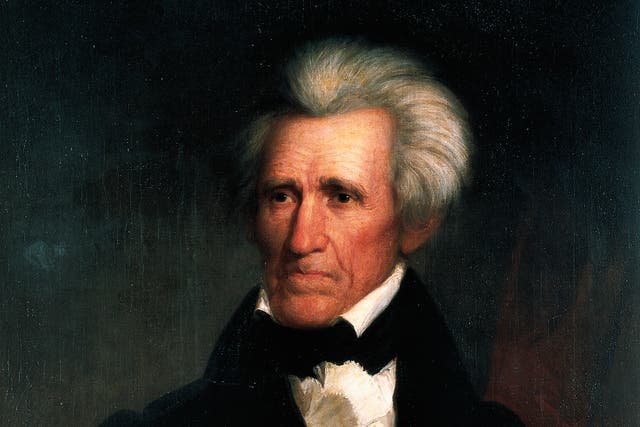
The seventh president has a particularly harsh record when it comes to enslaved people and Native Americans.
Updated: August 29, 2018 | Original: April 30, 2018

Should Andrew Jackson be revered or reviled? The question of how to grapple with the seventh president’s tarnished reputation has persisted since Old Hickory’s lifetime.
Known as a strong-willed, argumentative and combative personality, Jackson, who served as president from 1829 to 1837, inspires conflicting reactions. Admirers cite him as a populist hero who challenged the political establishment and ushered in a key era of American exploration and westward expansion. Critics say it's wrong to valorize him since he owned enslaved people, treated them harshly and forced Native Americans to be removed from their ancestral lands, causing thousands of deaths. Once so revered that his face was chosen for the $20 bill, Jackson has more recently inspired a tussle between consecutive Treasury secretaries over whether to keep him there. And in 2018, news that Jackson’s grave was vandalized at The Hermitage, his plantation in Nashville, Tennessee, breathed new life into the debate. Here’s why so many have questioned his legacy.
During his lifetime (1767-1845), Jackson went from poverty to wealth because he personally embraced the institution of slavery. Enslaved workers grew his cotton, built and tended his house and helped him gain a social foothold in Southern society. Jackson owned as many as 161 enslaved people, buying and selling them, using their labor to build his fortune and even bringing them to the White House to work for him.
Records show he beat his enslaved workers, including doling out a brutal public whipping to a woman he felt had been “putting on airs.” And when any of them ran away, he pursued them and put them in chains when they were recovered. In an 1804 newspaper advertisement for a 30-year-old runaway named Tom, he offered an extra $10 for every 100 lashes doled out to the escapee.
As the United States expanded, the seventh president also opposed policies that would have outlawed slavery in western territories. And when abolitionists attempted to send anti-slavery tracts to the South during Jackson’s presidency, he helped ban their delivery and called the anti-slavery advocates monsters who should “atone for this wicked attempt with their lives.”
Despite Jackson’s support of slavery and participation in the slave trade, early biographers downplayed his pro-slavery stance, writes historian Mark R. Cheatham, who calls their reluctance to examine Jackson as a slave owner “surprising and disappointing.”
African Americans weren’t the only people Jackson felt should be subservient to wealthy white men. His presidency is perhaps best remembered for his cruelty to Native Americans. A proponent of “Indian removal,” Jackson wanted to clear newly acquired territories of the Native Americans who lived there so that white settlers could claim the land—and its natural resources—as their own.
Jackson’s Indian Removal Act resulted in the forced displacement of nearly 50,000 Native Americans and opened up millions of acres of their ancestral land to white settlement. He insisted it was for the best; the Native Americans, whom he saw as savages and referred paternalistically to as “my red children,” were, to him, merely collateral damage in a grand push to achieve progress for white Americans. Meanwhile, the policies disrupted and destroyed Native American lives. Tens of thousands died during forced removals like the Trail of Tears. Languages died out as Native Americans were forced to assimilate. And Native Americans who were displaced still struggle with poverty and intergenerational trauma.
During his presidency, Jackson signed into law nearly 70 removal treaties with Native Americans, who were pressured into trading their land for confined reservations in the west. Many such treaties were signed by minority groups within larger Native American bands and tribes that objected to the agreements; the government enforced them anyway, turning those who resisted removal into trespassers on land they had owned for centuries. Those who tried to stay were forced to leave by the U.S. military.
In light of a nationwide movement to remove monuments to Confederate leaders from public spaces, Jackson’s history as a slave owner has received new scrutiny. As monuments to figures like Robert E. Lee are removed, there’s been speculation as to whether Jackson, who is the subject of memorials throughout the United States, is indeed worthy of them.